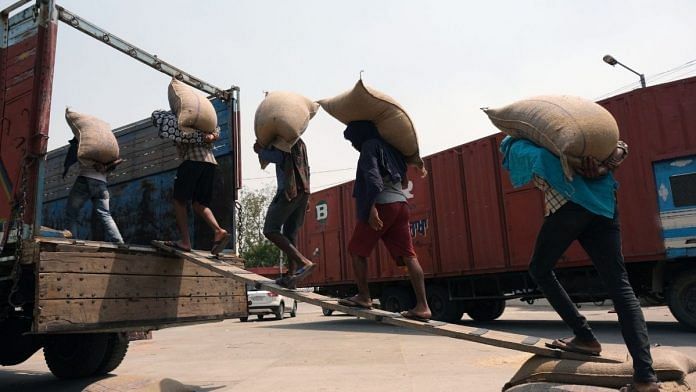New Delhi: India is unlikely to revoke the ban it has imposed on wheat shipments, despite pressure from some of its close strategic partners like the US, which believes that New Delhi should “reconsider” the decision.
Last week, India imposed a sudden ban on the export of wheat, bringing it under the “restricted” category, in order to control domestic prices. This means exports will be allowed only after prior approval from the central government based on the request of the purchasing country’s government.
Facing criticism that the move could worsen the global food crisis, the Narendra Modi government Tuesday announced “some relaxation”, but only enough to honour all wheat shipments that were registered with the customs department until 13 May.
The government has said the decision to ban exports was taken due to soaring wheat prices globally, which has rise to food security issues in the wake of the Russia-Ukraine conflict, but claims it has not taken any “unreasonable and stiff” policy measures like other countries, top-level official sources told ThePrint.
“Many countries have put restrictions in the form of export taxes on their food exports in view of the Ukraine crisis and failed crops for next season,” a senior government official said.
The official added that western countries were “no different during the Covid crisis with medicines and vaccines”.
On Tuesday, the government allowed an 61,500-metric ton (MT) consignment of wheat bound for Egypt. The consignment was already under loading at the Kandla port in Gujarat, and the relaxation came after a request by the Egyptian government to permit the wheat cargo, according to a press statement issued by the Ministry of Commerce and Industry.
Also read: Ban on wheat export is tyranny. It stops farmers from getting a windfall from higher prices
US to raise issue at UNSC meet on food security and conflict
On 19 May, US Secretary of State Antony Blinken will chair an open debate on the link between conflict and food security at the UN Security Council (UNSC), where New Delhi’s decision will be discussed.
The US has urged India to “reconsider” its decision.
“We have seen the report of India’s decision. We’re encouraging countries not to restrict exports because we think any restrictions on exports will exacerbate the food shortages,” Linda Thomas-Greenfield, US Representative to the United Nations, said Monday.
She also said: “India will be one of the countries participating in our meeting at the Security Council, and we hope that, as they hear the concerns being raised by other countries, they would reconsider that position.”
The debate, according to the US, will ensure that the growing food insecurity does not create new conflict and instability in fragile nations.
India, meanwhile, is likely to highlight at the meet that it has not stopped exports of rice, which will enable it to address the food security issues to a large extent, another senior government official said.
‘Window has been kept open’
The consternation about India’s wheat export ban is not limited to the US. “If everyone starts to impose export restrictions or close markets, that would worsen the crisis… we call on India to assume its responsibility as a G20 member,” German agriculture minister Cem Özdemir said at a news conference in Stuttgart last week.
However, official sources have said the ban will be lifted only when global prices cool down and supplies become steadier.
“We do not want wheat to go in an unregulated manner to places where it might just get hoarded or may not serve the purpose of serving the food requirements of vulnerable nations. That’s why the government-to-government window has been kept open,” Commerce Secretary B.V.R. Subrahmanyam said Saturday.
In its Tuesday press release announcing “some relaxation” in the original notification, the Commerce Ministry also elaborated that the export ban was intended to serve three main purposes — ensuring India’s food security and checking inflation, helping countries that are facing food deficit, and maintaining India’s reliability as a supplier.
The order also aimed to provide a clear direction to the wheat market to prevent hoarding of wheat supplies, the press release added.
Wheat prices, meanwhile, rose by 6 per cent after India announced the ban as it is the world’s second-biggest producer after China.
With inputs from Pia Krishnankutty
(Edited by Nida Fatima Siddiqui)
Also read: India faces flak for wheat export ban, experts fear move could trigger domino effect



